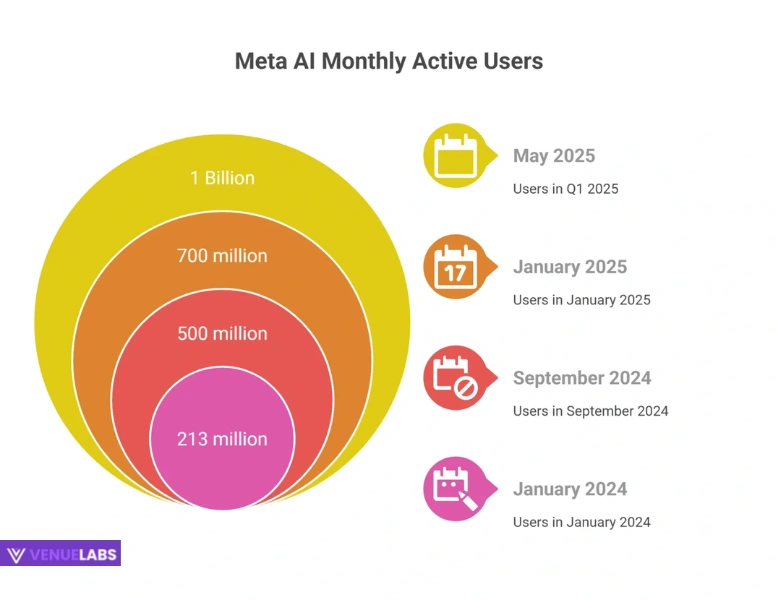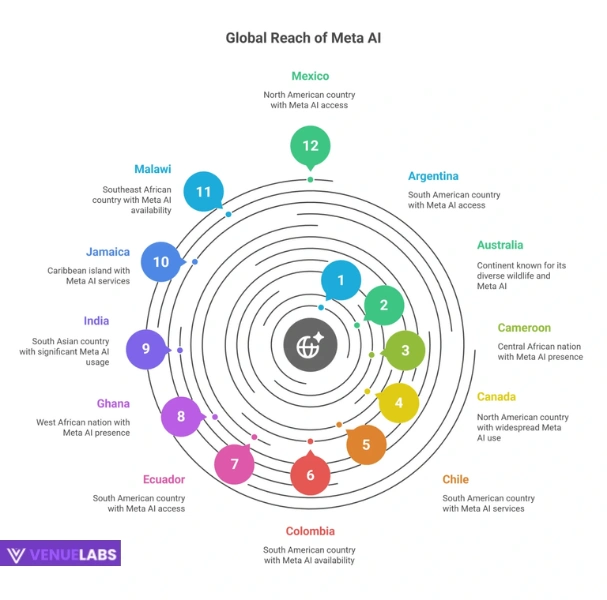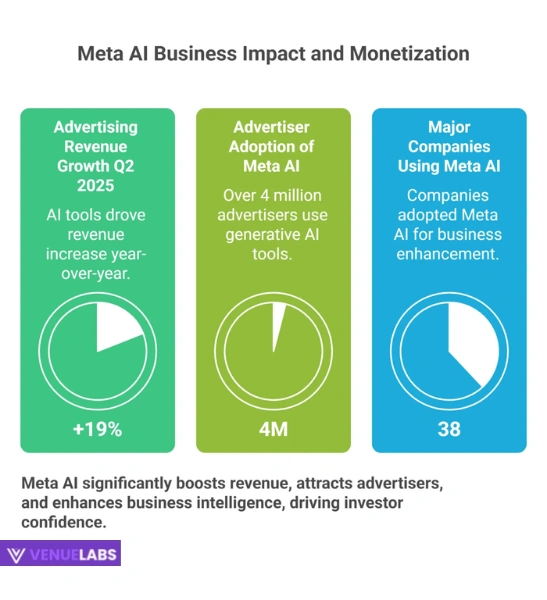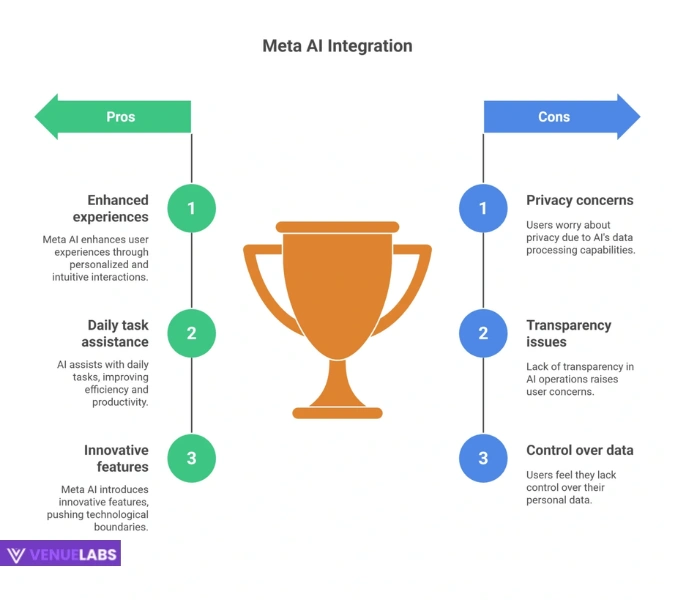Meta AI has rapidly become a significant force in the artificial intelligence landscape, reaching an incredible milestone of over 1 billion monthly active users by early 2025.
This rapid adoption isn’t just about a new chatbot; it’s about AI seamlessly integrating into the apps and devices we use every single day, fundamentally changing how we chat, create, and connect.
For anyone interested in the future of AI and how it impacts digital interaction, understanding Meta AI users statistics 2025 is absolutely crucial.
Meta didn’t just launch another standalone AI tool; it strategically wove AI capabilities directly into its ecosystem of widely popular applications like WhatsApp, Instagram, and Facebook.
This smart integration has allowed Meta AI to grow at an unprecedented pace, quickly becoming the world’s second-largest AI assistant, right behind ChatGPT. T
his article dives deep into the fascinating numbers behind Meta AI’s explosive growth, explores its impact, and offers insights into how you can leverage its capabilities for your benefit.
Meta AI Users Statistics: The Meteoric Rise of Meta AI

Launched on September 27, 2023, primarily in the second generation of Ray-Ban Meta Smart Glasses, Meta AI quickly expanded its reach by integrating into Meta’s core applications.
This strategic move tapped into the massive existing user bases of WhatsApp, Instagram, and Facebook, fueling its rapid ascent.
From its initial launch, Meta AI has demonstrated staggering growth. It quickly surpassed 40 million daily active users and 500 million monthly active users worldwide in late 2024.
By early 2025, it had more than doubled that figure, crossing the 1 billion monthly active user mark. This makes it one of the fastest-growing AI assistants in the market.
Here’s a timeline illustrating Meta AI’s remarkable user growth:
| Time Period | Monthly Active Users |
| May 2025 (Q1) | 1 Billion |
| January 2025 | 700 million |
| September 2024 | 500 million |
| January 2024 | 213 million |
Source: Statista, The Information
This exponential growth highlights how quickly everyday people are adapting to and adopting AI when it’s made easily accessible within their familiar digital environments.
Who’s Using Meta AI and Where? The User Demographics
Meta AI’s massive user base is diverse, spanning across numerous countries and integrated deeply within various Meta platforms.
By Q1 2025, roughly one in four of Meta’s global monthly active users (which stands at approximately 3.98 billion across Facebook, Instagram, WhatsApp, and Messenger) had already interacted with Meta AI features.
Here are some key statistics about Meta AI users in 2025:
- 1 billion monthly active users across Meta’s apps as of Q1 2025.
- More than 40 million people use Meta AI daily.
- 185 million people use Meta AI weekly.
- User growth rate has increased by 100%, doubling from 500 million users in late 2024.
- Nearly two-thirds (63%) of Meta AI engagements occur on WhatsApp.
- India is Meta AI’s largest and most active market.
- With a 15–20% market share, Meta AI is the world’s second-largest AI assistant.
This breakdown reveals a crucial insight: Meta AI’s success stems from embedding AI directly into existing user workflows, rather than requiring users to adopt an entirely new application.
Also read about: Grok AI Statistics
Platform-Specific User Breakdown
Let’s explore how users are engaging with Meta AI across each of Meta’s flagship platforms:
WhatsApp AI Users
WhatsApp dominates Meta AI usage, accounting for approximately 630 million active AI users, which is a stunning 63% of all Meta AI interactions. This makes WhatsApp the primary gateway for AI adoption globally, even though its total user base is 2 billion. The 31.5% penetration rate means roughly 1 in 3 WhatsApp users globally have tried Meta AI features, leveraging it for:
- Intelligent chat responses and suggestions.
- Information retrieval within conversations.
- Quick fact-checking and content generation.
Also read about: WhatsApp Statistics
Instagram AI Users
Instagram hosts approximately 270 million Meta AI users, representing 27% of total AI interactions. On Instagram, Meta AI enhances the creative and interactive experience through features like:
- AI-generated stickers and graphics for Stories.
- Photo editing and enhancement suggestions.
- Caption and hashtag recommendations.
- Visual content analysis and improvement tips.
Facebook AI Users
Facebook accounts for approximately 100 million Meta AI users, representing 10% of total interactions. While a smaller percentage of Facebook’s massive user base (3.3% penetration rate), Meta AI powers essential functions here, including:
- Improved search functionality across Facebook’s vast content library, helping users discover relevant content.
- Providing additional context for posts and discussions.
- Supporting the 4 million advertisers who use Meta’s generative AI tools for business purposes.
Also read about: Facebook Statistics
Meta AI Geographic User Distribution

Meta AI is strategically rolling out its services across the globe. By mid-2025, it is available in 48 countries worldwide, making it one of the most geographically distributed AI assistants.
India stands out as Meta AI’s largest and most engaged market globally, with an estimated 300 million users accounting for roughly 30% of Meta AI’s total user base. This highlights the immense potential of AI adoption in highly connected, mobile-first regions.
Here is a list of countries where Meta AI is available, reflecting its broad international presence:
- Argentina
- Australia
- Cameroon
- Canada
- Chile
- Colombia
- Ecuador
- Ghana
- India
- Jamaica
- Malawi
- Mexico
- New Zealand
- Nigeria
- Pakistan
- Peru
- Singapore
- South Africa
- Uganda
- United States
- Zambia
- Zimbabwe
Beyond countries, Meta AI also supports 8 different languages, including English, French, German, Hindi, Hindi-Romanized Script, Italian, Portuguese, and Spanish, further enhancing its global accessibility.
Meta AI’s Place in the Market: Share and Growth
The AI assistant landscape in 2025 is intensely competitive, with a few major players vying for dominance. Meta AI has quickly established itself as a formidable contender.
Here’s how Meta AI stacks up against its competitors:
| AI Assistant | Estimated Market Share (%) | Monthly Active Users (2025) |
| ChatGPT | 60.40% | 800M |
| Meta AI | 15–20% | 1B |
| Microsoft Copilot | 14.30% | 250M |
| Google Gemini | 13.50% | 200M–300M |
| Claude AI | 3.20% | 32M |
While ChatGPT currently holds the largest market share, Meta AI’s rapid climb to 1 billion users, largely through its integration strategy, positions it as a strong challenger. Its user growth rate increased by a remarkable 370% from January 2024 to May 2025, with an average monthly growth rate of 9.1% during its most explosive period.
The Business Impact and Monetization of Meta AI

Meta AI’s explosive growth isn’t just about consumer adoption; it’s profoundly impacting business and monetization strategies across Meta’s platforms. The integration of AI tools is reshaping advertising and enterprise engagement.
- Advertising Revenue Growth: Meta’s AI tools have contributed to a 19% year-over-year increase in advertising revenue as of Q2 2025. AI-driven “Advantage+” campaigns alone are exceeding a $20 billion annualized run rate.
- Advertiser Adoption: More than 4 million advertisers now use Meta’s generative AI tools to design, test, and optimize ad campaigns on Facebook, Instagram, and WhatsApp. AI-driven automation allows brands to create countless ad variants, rapidly A/B test creatives, and deliver highly personalized ads at scale, leading to improved conversion rates and ROI.
- Business Intelligence: Over 38 major companies and organizations have adopted Meta AI to enhance business intelligence, automate customer service, and deepen market research, making AI a core part of their digital operations. These include companies like TEKsystems, Deere & Company, and Cisco Systems, Inc. The majority of these customers are small to medium-sized businesses, indicating broad accessibility and utility.
- Stock Performance: The positive impact of Meta AI has also reflected in Meta’s stock performance. Following the announcement of significant user milestones, Meta’s stock price saw a notable increase, reaching new all-time highs. This demonstrates investor confidence in AI as a key driver for Meta’s future business success.
Meta AI’s Future: Standalone App and Strategic Investments
Meta is clearly betting big on AI, and its future projections reflect a massive commitment to this technology. The company has pledged between $64 billion and $72 billion in infrastructure investment for 2025 alone, primarily focused on AI research, data centers, and the global rollout of new AI-powered features.
The Standalone Meta AI App
A significant development in Meta AI’s journey is the launch of its standalone Meta AI app in April 2025. This represents Meta’s bold move to directly compete with other leading AI assistants like ChatGPT. Powered by advanced models such as Llama 4, this dedicated app offers features unavailable in the integrated versions, including:
- Advanced text, voice, and image generation.
- Content remixing and sharing capabilities without needing to switch between other Meta platforms.
The standalone app attracted an estimated 10–20 million early adopters within its first few months, despite initial availability being limited to markets like the US, Canada, Australia, and New Zealand.
This app is steadily gaining market share, particularly among younger users who seek a comprehensive, ChatGPT-like experience within the Meta ecosystem.
Future expansion into India, Europe, and Latin America is expected to significantly boost its active user base. While integrated AI remains dominant, the standalone app caters to power users and those eager to explore the cutting edge of AI technology.
What Users Are Asking About Meta AI on Forums

Beyond the official statistics, online forums like Quora and Reddit offer a valuable glimpse into real user sentiment and the practical questions people have about Meta AI. Several key themes are emerging as users engage with this evolving technology:
One major area of discussion centers on privacy and data usage for AI training. Many users are asking:
- “How does Meta AI use my personal data from chats and posts?”
- “Can I opt out of my data being used to train Meta AI models?”
- “What are the privacy implications of AI being integrated into all my Meta apps?”
This reflects a growing concern among users about the transparency and control they have over their information in the age of pervasive AI. Meta’s past actions, like the temporary ban in Brazil for processing user data to train AI, highlight these ongoing user anxieties. Companies like Meta will need to continue addressing these concerns with clear policies and user-friendly controls.
Another common theme revolves around the practical utility and integration of Meta AI into daily life:
- “How can Meta AI actually help me with my daily tasks on WhatsApp or Instagram?”
- “Is Meta AI just a chatbot, or can it genuinely help with content creation?”
- “What are the best tips and tricks for getting the most out of Meta AI features?”
Users are moving beyond the novelty and seeking tangible benefits, such as generating social media captions, drafting messages, or getting quick information without leaving an app. The discussion reflects a desire for seamless assistance that genuinely enhances their existing Meta experience.
Finally, there’s considerable discussion about the accuracy and reliability of Meta AI’s responses, especially compared to other leading AI models:
- “How accurate is Meta AI’s information compared to ChatGPT or Google Gemini?”
- “Are there specific types of queries where Meta AI performs better or worse?”
- “What are the limitations of Meta AI, and how can I work around them?”
These questions indicate that users are critically evaluating AI performance and understanding that different models may excel in different areas. This critical assessment will drive further refinement and specialized applications of Meta AI in the future. Understanding these user questions helps Meta—and developers building on its platforms—to refine the technology and address user needs directly.
FAQs About Meta AI Users Statistics
1. How many monthly active users does Meta AI have in 2025?
As of Q1 2025, Meta AI has crossed 1 billion monthly active users across Meta’s family of applications, making it one of the fastest-growing AI assistants worldwide.
2. Which Meta app sees the most engagement with Meta AI?
WhatsApp dominates Meta AI usage, with approximately 63% of all Meta AI interactions occurring within the messaging platform, highlighting its significant role in global AI adoption.
3. How has Meta AI's growth impacted Meta's business and advertising?
Meta AI’s explosive growth has positively impacted Meta’s business, contributing to a 19% year-over-year increase in advertising revenue as of Q2 2025, with over 4 million advertisers utilizing its generative AI tools to optimize campaigns.
4. What is the significance of the standalone Meta AI app?
The standalone Meta AI app, launched in April 2025, signifies Meta’s direct competition with other leading AI assistants by offering advanced text, voice, and image generation features in a dedicated space, beyond the integrated app experiences.
5. What are some key user concerns about Meta AI discussed on forums?
Users on forums like Quora and Reddit frequently discuss concerns about privacy and how Meta AI uses personal data for training, its practical utility and seamless integration into daily tasks, and the accuracy and reliability of its responses compared to other AI models.
Also Read:
- Reddit Statistics
- Voice Search Statistics
- Link Building Statistics
- Android Statistics
- Marketing Automation Statistics
Conclusion: Meta AI – An Invisible Assistant Shaping Our Digital Lives
Meta AI’s journey to over a billion users in just over a year is a testament to its strategic integration and the inherent human desire for intelligent assistance.
By weaving itself into the fabric of WhatsApp, Instagram, Facebook, and now even Ray-Ban smart glasses, Meta has pushed AI beyond standalone applications, making it an almost invisible assistant in how we communicate, create, and perceive the world.
For businesses, this AI surge is already transforming advertising, customer engagement, and business intelligence. For individuals, Meta AI is quietly becoming a go-to tool for everything from drafting messages to generating creative content.
With its standalone app, global expansion plans, and billions invested in infrastructure, Meta is clearly positioning AI at the very core of its future strategy. One thing is certain: Meta AI isn’t just keeping pace in the AI race; it’s becoming the AI that people reach for without even thinking.
